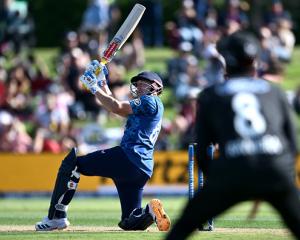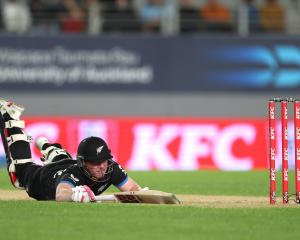News this month the CLT has been discontinued has forced the Otago Cricket Association to re-think its position about whether it employs an import for the domestic twenty20 tournament this summer.
That means popular Volts overseas professional Ryan ten Doeschate is probably out of a job.
OCA chief executive Mike Coggan said a definitive decision had not been reached. However, he conceded the association was unlikely to commit to a professional in the current environment.
''I get terrific feedback from everyone involved in Otago cricket about what Ryan has offered and what he has done as a player,'' Coggan said.
''That was one of the major challenges we had to think about when we decided [whether to look] at bringing in an overseas player.''
The lure of a total prize pool of $US6 million ($NZ9 million) always made the decision a simple one.
You would secure as many imports as you were allowed or could comfortably afford.
It boosted the association's chances of qualifying for the CLT and lifted the profile of the team.
But with that financial incentive removed, will other associations follow Otago's lead?
''It is hard to say,'' chief executive of the New Zealand Cricket Players Association Heath Mills responded.
''Obviously, some of the major associations may choose not to invest in an overseas player. That gives more opportunities to local players here in New Zealand, which is a good thing.
''But, conversely, a lot of the overseas players have added a lot to the competition ... so we want overseas players to come down here and enhance the competition.''
Mills said the challenge ahead was to lift the profile of the Super Smash.
''We need it to stand on its own two feet as a quality event, regardless of whether there is a Champions League or not.
''If we have an event which is successful both commercially and from a playing point of view, then players will want to come and play and major associations will be interested in bringing the best players in the world down here.''
New Zealand Cricket's T20 competition began life as a hit and giggle.
It was introduced in January 2006.
The six associations were divided into two conferences.
Teams played two games each with the conference winners going on to contest the final.
Canterbury claimed the inaugural title.
The games were scheduled to fit in around the one-day competition.
But following the launch of the CLT in 2009 - the 2008 tournament was cancelled - NZC began to take the format more seriously.
Otago qualified for the CLT in 2009. Its participation payment of $US500,000 was divided among the six associations and the Otago squad.
The Volts returned to the tournament in 2013, narrowly missing a place in the semifinals and an even bigger pay day.
With that revenue stream now snuffed out, it seems the days of flying in imports are gone.
The tournament will lose some of its lustre as a result.
That said, scheduling it in November rather than in late December and January had a negative impact on crowds last season and probably will again this summer.
NZC has acknowledged the timing is not ideal but argues teams could not attract the best players in the world if the Super Smash clashed with Australia's Big Bash T20 tournament.
That argument seems redundant now.
But the other complicating factor is NZC is one year into a six-year broadcasting deal with Sky TV.
Sky needs product in November, not late December or January.











